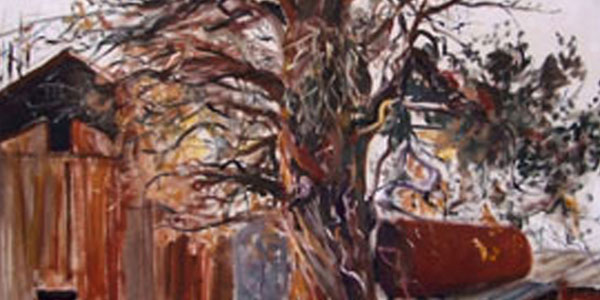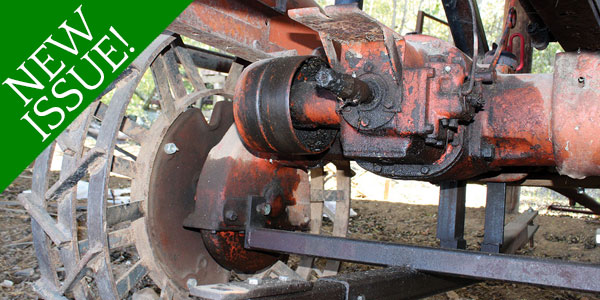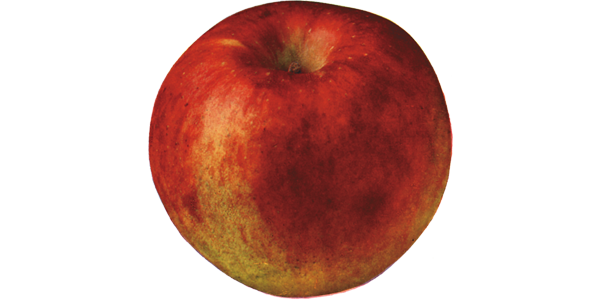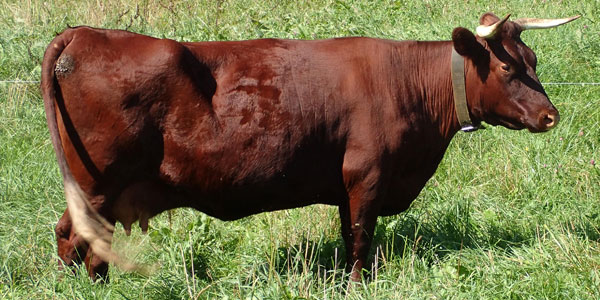
Old Man Farming: The Gamble with Everything at Stake

Old Man Farming: The Gamble with Everything at Stake
book review by Paul Hunter of Seattle, WA
The message of Lynn Miller’s new book Old Man Farming is urgent: the hour is late, the need great as never before, and there is much work to be done. Why then does he sound hopeful, even cheerful — energized? It seems there are other hidden messages that will only dawn on the reader as he undergoes this journey for himself.
There is definitely something different and elusive in the amalgam of these pages. I thought I was prepared for the Lynn Miller I know and value talking farming, encouraging us to take up the tools and get to the field. Farming is an innately modest enterprise where with our attention and efforts plants and animals grow up and feed us, and we take quiet credit, in much the way that the body, with the care and attention of medical professionals, can be coaxed to heal itself. And those two related matters, healing the land and the self, are what LRM has always been about. That is why his essays and speeches have always been so intimate, touching us where we live and work, dream and rest. But this book is a different kind of creature, Lynn Miller in one of the corridors of Dante’s Purgatory, beset by the ills of not just his advancing years, but of the deluded and potentially catastrophic Age in which he finds himself. Is there time to set things right? Lynn Miller is not one to say I told you so. He is more likely to leave a breadcrumb trail, locate an example you might follow, a thread you could pull until you’d unraveled the ordinary, and discovered inklings of yourself. Here he is looking out at his rain-drenched fields:
After a long, sustained summer rain, the new fleeting light comes into our landscape as though filtered through a wet windblown prism. It is a fresh steaming luminance, bright and useful. Perhaps that usefulness is why we don’t want it to go away. We want to hold onto it. It often puts us in a meditative state as we look, cocking our heads sideways and wondering how it is we never noticed that tree before or how the colors on that hillside work so well together or how the space between that distant hill and this rock outcropping has a definite shape. (p. 77)
How else begin to answer the why of one farmer’s life, what holds and soothes him, even amid such extremities? At the same time that he does some necessary deflating of balloons, some answering of perhaps unwelcome questions, as it were for the good of the order, the book is blessed to share such smoldering reveries and cactus spines of the shoeless curmudgeon sprinkled lightly about underfoot.
But what is most notable in this new book is a kind of coming of age saturated deep into its fabric. With age comes outspoken courage, saying your mind, speaking your piece. Former hopes and fears, ambitions and delusions fall away. As the great Irish poet Yeats says, “We wither toward the truth,” and here is truth aplenty. Lynn Miller has always taken his role as editor and spokesman personally, but here are hard subjects coupled with a wide and easy range of expression. Jokes like “She ran like a young widow after a pie thief, with determination and pluck,” jostle in the mind alongside his declaration that he feels “the corrosive constant crawl of evaporating time,” a ferocious and unapologetic mixed metaphor that slides in and sticks. And there is more here of what I can’t help but call courage, as contrasted with something said for its shock value, or as veiled education. Or, Heaven help us, to make a buck.
Consider his measured indictment, locating the source of most recent troubles for small-scale farming:
Who’s the enemy? Do we have an enemy? Are we the enemy? Who or what is responsible for the agribusiness mess we seem to be fighting? It’s too easy to point to the multi-national corporations who are working voraciously, if clumsily, to try to control all aspects of food production on the planet. Their motives come down to a grab for the power to control markets and thereby profit. We know where they are coming from and we fear where they are taking us. But what they are doing would not be possible without the aid and comfort of well-oiled, ‘professional,’ store-bought government. Yet the real meanies, the real villains in this affair, aren’t those elected morons of shellacked insouciance, of girdled intellect, as well as vulgar untrackable ancillary income. The real bad guys are the architects of our agribusiness system, generations of stiff-necked bureaucrats, statisticians, ag economists, and program directors with the USDA, career professionals who have been high-jacked by industry to do its bidding right or wrong. From their closeted, disconnected, mean-spirited myopia they have worked relentlessly to reduce agriculture to its lowest common denominator—production. They have been working to get people off the land and render farming into a purely chemical/industrial equation. (p. 50-51)
Something in him is loath to level the often-used political charge of “enemy” even so. A page earlier he had noted with clarity and generosity how we are all in this together:
As this society, in this time, when we pay close attention to the world and those around us, we have a pretty clear understanding of what our society needs. We need thousands more doctors and nurses who want to help people and prevent illness. We need thousands more dedicated, intelligent, curious teachers who want to teach. We need people in positions of power and influence who care about the planet and our environment. We need dedicated, intelligent, reluctant leaders, who, in spite of how busy and successful they are in their chosen walks of life, are prepared to give of themselves to work selflessly and ‘part-time’ in governance. You can continue the list. But make sure that you add this: we need millions of intelligent, dedicated, craft and soil-based, independent farmers who want to raise good food and strong families. Yes, millions. The planet needs millions of true farmers to feed us all and to keep the waters clear, the soil fertile, the biodiversity vibrant, the lights on, and our governments and industry at bay. (p. 50)
Notice how farming is seen as one with health and education and politics. And what a sane and nuanced argument he makes for “true farmers” as central to a healthy scheme of things.
Lynn Miller’s other books of essays have seemed more anthologies of farming issues and wisdom than this one, which begins by eschewing sage advice and casting a steely eye on the old farming school of hard knocks, though he ultimately finds his way to a more personal stand regarding his effects on the land and on his neighbors. Wandering his fields on chores with his stock dog Lucky, wrestling a failed 600 pound pump into his pickup for repairs, he finds peace, reconfirmed in both his joys and labors. Although Old Man Farming is born of the Small Farmer’s Journals’ quarterly editorial impulses, this book feels more closely knit, more persistently reasoned and felt all the way. The book’s continuity may be due more to the nearly constant pressure to sustain the enterprise, during the recent crisis in the nation’s and the world’s economy, that has hardly let the writer breathe between these offerings. These are his constant preoccupations, the answers that spur him on. The pedal has been pressed to the floorboard, and it’s been uphill all the way.
So maybe that is what this reader feels, how the work is born of an internalized yet shared struggle. Its 25 pieces include a “premise” about the nature of farming and its future, and an afterword that directs us back over a time of emergency, a crisis caused by great thoughtless, reckless, greedy acts with potentially disastrous consequences. But he turns those destructive and selfish forces on their ear, as he ends by saying:
…the good news is that ‘the great collapse’ or the ‘second great depression’ gives us back our true songs, our hand-made artistry, our blood-soaked words, and most valuable of all an opportunity to revisit enlightenment. (p. 206) Beneath these words you can feel the stubborn heartbeat, the bedrock conviction that the small farmer’s position on the land may have seemed precarious, but is ultimately unassailable. There are excuses aplenty here for hard and heated words. But when these are weighed against the daily work, he chooses to offer the reader “enlightenment,” joy and release.
If you know Lynn Miller, you may forgive his presumptions or not, this late, this deep in, but need to give his readings of recent and ongoing economic, social, political and spiritual changes a hearing. And if you don’t yet know Lynn Miller, you may be late to the party where he has been speaking out with clarity and strength for nearly forty years, but if you lend an ear you might find you’ll quickly fall in step alongside. He is by now a contrarian of long standing, passionately envisioning and defending the right livelihood of small-scale farming, down where the chickens scratch and farmers take it personal, a quixotic knight in rusty armor who is oiled at the joints so doesn’t squeak.
And the payoff? The book unselfconsciously enfolds the reader in the fabric of its author’s life in ways that lift and sustain us, as in this passage where he offers the thought that gives the book its title and not-so-secret strength:
Today I put far more enthusiasm and energy into the notion of planting more trees, many more. I don’t think or worry so much about the aged frail trees now leaning. Therein lies part of the secret strength of old men (and women) farming. We reach back and forth in time with the earned intimacy of overlapping growth cycles and how we might magically influence those. We know, completely and well, where farming choices fit in the superb uncertainty of the natural world. And we, if of those long suited to the venture, embrace the odds. (p. 201)
Thoughts like “where farming choices fit in the superb uncertainty of the natural world” mark and brand this book. Here are linked not just what he accepts of the world but what he values and honors, in a deftly measured poetry. The stillness and sheer understatement of the phrase are reminiscent of that first snowfall that he savors for all it interrupts.
Yes, the hour is late and there is work to be done. And there are sleepless forces arrayed against us. But businessmen may presume to think they know farming when they don’t. Studying only quarterly balance sheets they crave insurance against risk, digital quantification of weather with hourly updates. They want cheap or free inputs, want to slough off their toxic slurry onto the public, all the while oblivious of how the sow’s ear and pig’s squeal have long been sung by those who know and celebrate their meaning, who know to make do with what comes.
Old Man Farming is not just a specialist book for a narrow taste, those attuned to the farming life. It should be required reading not just for Congress members, Ag lobbyists and Ag Industrialists, but should be part of the curriculum for naturalists young and old—for buffalo lovers and bird lovers, gator wranglers and bee fanciers. There are hard subjects here, hard truths concerning motivation, one’s choice of right livelihood, one’s identity. What a life is made of, how it flowers and fruits. How to know you’re on the right path, and how to keep going where it seems untraveled, steep and rough. Farming as a tangible metaphor is here offered to the pilgrim in all of us. We need to know our limits, and the limits and needs of this sweet planet, and that includes all its other inhabitants sometimes menaced and poisoned and commodified by our mere presence. We need to modestly try to fit into its great living dance.
– Paul Hunter
Dear Lynn,
Thank you very much for a copy of Old Man Farming. I’ve enjoyed reading it. You have a unique and even electrifying way to use language. I like it very much.
And on top of that, you are quite an artist too! I have been drawn to your magazine for many years, although I managed to bum copies from friends (being too cheap to subscribe).
But I confess this is the first book of yours that I have read. And I read every chapter. I mean it when I say your writing style is different and very arresting.
I of course agree with what you are saying and now regret that at age 83 I didn’t take the time to try to get to know you in earlier days. I will mention your book supportingly whenever I get a proper opportunity. I’ve got a couple of references to you in my new book to be published late this year or early next.
Again thanks.
Sincerely, Gene Logsdon, Upper Sandusky, Ohio




